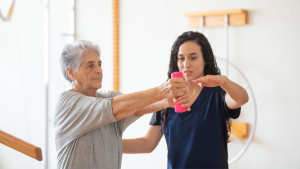Osteoporosis is a condition that makes bones weak and more likely to break. It’s common in seniors, especially women after menopause. The bones lose minerals like calcium, which makes them brittle and prone to fractures. These fractures often cause pain, especially in the spine, hips, and wrists. Understanding how osteoporosis is connected to bone pain and learning ways to prevent it can help seniors lead a more comfortable life.
What is Osteoporosis?
Osteoporosis is a disease where the bones become fragile and thin. This happens because the body loses bone mass faster than it can replace it. As a result, bones can break easily, even from a minor fall or, in severe cases, from sneezing or bending over. This condition is often called a “silent disease” because bone loss occurs without symptoms until a fracture happens.
Preventing Osteoporosis in Seniors
Preventing osteoporosis in seniors is crucial to avoid bone pain and fractures. Here are some tips to help keep bones strong:
- Calcium-Rich Diet: Seniors need to eat foods rich in calcium like dairy products, green leafy vegetables, and almonds. Calcium is a key building block for strong bones.
- Vitamin D: Vitamin D helps the body absorb calcium. Spending time in the sunlight, eating fatty fish like salmon, or taking supplements can help maintain adequate levels.
- Exercise: Weight-bearing exercises like walking, jogging, or dancing help keep bones strong. Resistance training, like lifting weights, is also effective.
- Avoid Smoking and Excessive Alcohol: Smoking and heavy drinking can weaken bones. Quitting these habits can help prevent bone loss.
- Bone Density Test: A bone density test can help detect it before a fracture occurs. Seniors should talk to their doctor about getting this test.
How Osteoporosis Causes Bone Pain
Bone pain in osteoporosis often comes from fractures. The bones most commonly affected are the spine, hips, and wrists. Spinal fractures can lead to chronic back pain and a hunched posture. Hip fractures can cause severe pain and may require surgery. Wrist fractures are painful and can limit the use of the hand.
The pain can be constant or occur only when moving. In some cases, it can become debilitating, affecting daily activities and reducing the quality of life.
Popular Medications for Osteoporosis and Bone Pain
Managing osteoporosis and bone pain often requires medication. Here are five popular options:
- Bisphosphonates: These are the most common drugs used to prevent bone loss. Examples include Alendronate (Fosamax) and Risedronate (Actonel). They slow down the rate at which bones break down.
- Calcitonin: This is a hormone that helps regulate calcium levels in the body and is used to treat osteoporosis and relieve bone pain.
- Raloxifene (Evista): This drug mimics estrogen, which helps maintain bone density in postmenopausal women.
- Teriparatide (Forteo): This is an anabolic (bone-building) agent that stimulates bone growth and increases bone density.
- Over-the-Counter Pain Relievers: For managing bone pain, drugs like Acetaminophen (Tylenol) or Ibuprofen (Advil) are often recommended. They help relieve pain and inflammation caused by fractures.
Osteoporosis can be tough for seniors, but with the right care, they can stay strong. To prevent it, seniors should exercise regularly and eat foods rich in calcium and vitamin D. Avoiding smoking and alcohol is important, too. Taking medicine prescribed by a doctor helps. Getting regular bone tests helps catch problems early. By following these steps, seniors can keep their bones strong and lower the chances of fractures and pain.
FAQs
- What are the early signs of osteoporosis?
- Early signs include back pain, loss of height over time, and a stooped posture.
- Can osteoporosis be reversed in seniors?
- While osteoporosis can’t be fully reversed, treatments can strengthen bones and prevent fractures.
- What foods help in preventing osteoporosis in seniors?
- Foods rich in calcium and vitamin D, such as dairy products, leafy greens, and fatty fish, help maintain bone health.
- How often should seniors get a bone density test?
- Seniors should get a bone density test every 1-2 years, or as recommended by their doctor.
- Is walking good for osteoporosis?
- Yes, walking is a weight-bearing exercise that can help strengthen bones and prevent bone loss.



